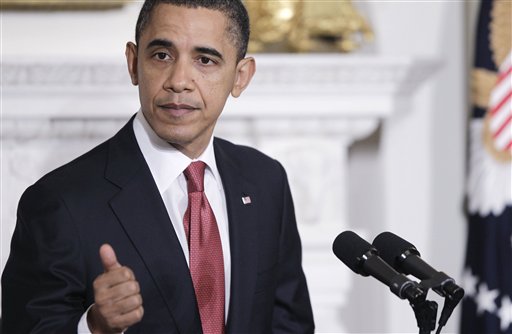President Barack Obama insisted Thursday that Libyan leader Moammar Gadhafi leave office, declaring he had lost his authority to lead. Obama also announced that U.S. military aircraft would play a humanitarian role by flying Egyptians who had fled Libya home to Egypt from makeshift camps in Tunisia.
“Moammar Gadhafi has lost the legitimacy to lead and he must leave,” Obama declared at a White House news conference with Mexican President Felipe Calderon.
Obama offered his most extensive remarks on the Libya crisis on a day when rebels strengthened their hold on the strategic oil installation at Brega after repelling an attempt by Gadhafi loyalists to retake it.
Pledging to hold Gadhafi and his loyalists accountable, Obama said the U.S. and the entire world were outraged by violence against the rebels. And he lauded U.N. sanctions meant to put international pressure on Gadhafi to give up power.
THIS IS A BREAKING NEWS UPDATE. Check back soon for further information. AP’s earlier story is below.
The Obama administration is tempering its tough talk on Libya with a dose of reality, explaining that even a no-fly zone over the country would require a military attack on Moammar Gadhafi’s regime. Two leading senators on defense matters responded Thursday by urging a strong U.S. stance aiding Gadhafi’s opposition.
The Pentagon is making it clear that it doesn’t want war.
Statements Wednesday by Defense Secretary Robert Gates and Secretary of State Hillary Rodham Clinton illustrated the administration’s effort to rein in “loose talk” about military options to force Gadhafi from power. It was an acknowledgement that, short of an unlikely military offensive by a U.S.-led coalition, the options for international action to stem the violence appeared highly limited, even as armed rebels pressed their fight against troops still loyal to the Gadhafi regime.
“Let’s just call a spade a spade: A no-fly zone begins with an attack on Libya to destroy the air defenses,” Gates told a congressional panel. The Pentagon could get the job done if ordered by the president, he said, but noted that an attack would require more air power than a single U.S. aircraft carrier, which typically carries about 75 planes. “It is a big operation in a big country,” Gates said.
On Thursday, Sen. John McCain, R-Ariz., took issue with Gates’ comment about “loose talk,” saying he believed it is well within the U.S. military’s capabilities to shoot down Libyan aircraft.
“May I just say, personally I don’t think it’s ‘loose talk’ on the part of the people on the ground in Libya or the Arab League or others, including the prime minister of England, that this option should be given the strongest consideration,” McCain said at a hearing to consider Gen. Martin Dempsey’s nomination to be the next Army chief of staff.
Endorsing McCain’s remarks, Sen. Joe Lieberman, I-Conn., told the hearing that another option is to provide U.S. air defense weaponry to the Libyan rebels and to train them in their use.
The unspoken subtext to Gates’ remarks on Wednesday was that with U.S. forces already deeply committed in Afghanistan, still winding down military operations in Iraq, and on the watch for surprises in Iran and elsewhere in the volatile Persian Gulf region, the risks associated with military action in Libya might be unacceptable.
In support of Gates’ point, Adm. Mike Mullen, chairman of the Joint Chiefs of Staff, said that despite media reports of Libyan aircraft attacking rebel areas, the Pentagon had not confirmed any air attacks. He also said it must be assumed that Libya’s air defenses are substantial.
Alluding to Gates’ announcement a day earlier that he had ordered two U.S. warships into the Mediterranean in case they are needed for civilian evacuations or humanitarian relief, Clinton said in separate testimony that the crisis calls for a mix of diplomacy and defense.
“We are taking no option off the table so long as the Libyan government continues to turn its guns on its own people,” Clinton said. But she told two separate Senate subcommittees that the government was far from being in a position to commit to a military response, even as she outlined grave concern about the instability affecting the North African country.
“One of our biggest concerns is Libya descending into chaos and becoming a giant Somalia,” Clinton said. “It is right now not something that we see in the offing, but many of the al-Qaida activists in Afghanistan and later in Iraq came from Libya and came from eastern Libya, which is now the so-called free area.”
Egyptian officials said two U.S. warships passed through the Suez Canal on Wednesday on their way to the Mediterranean Sea, closer to Libya. The amphibious assault ships USS Kearsarge and USS Ponce entered the canal from the Red Sea. The officials, speaking on condition of anonymity because they aren’t authorized to talk to media, said the Kearsarge carried 42 helicopters.
There has been no consensus in Congress for U.S. military action in Libya. Sen. John Kerry, chairman of the Senate Foreign Relations Committee, said Wednesday that while a no-fly zone over Libya is “not a long-term proposition,” the Pentagon should be prepared to go that route if so ordered.
Senators, meanwhile, worked on an aid package to Arab countries to solidify democratic gains and improve relations with citizens in a part of the world accustomed to U.S. support for questionable rulers. Kerry, D-Mass., called the financial assistance crucial to cementing a democratic transformation.
Some U.S. allies in NATO are mulling the idea of creating a no-fly zone over Libya. But Germany cautioned Wednesday against playing into charges that the West is unduly meddling in Arab affairs. For their part, military analysts warned that such an operation would be technically difficult and very expensive and that it was unlikely the U.S. or Europe wanted to take on the responsibility.
——
Associated Press writers Matthew Lee, Robert Burns and Donna Cassata in Washington and Gregory Katz in London contributed to this report.

